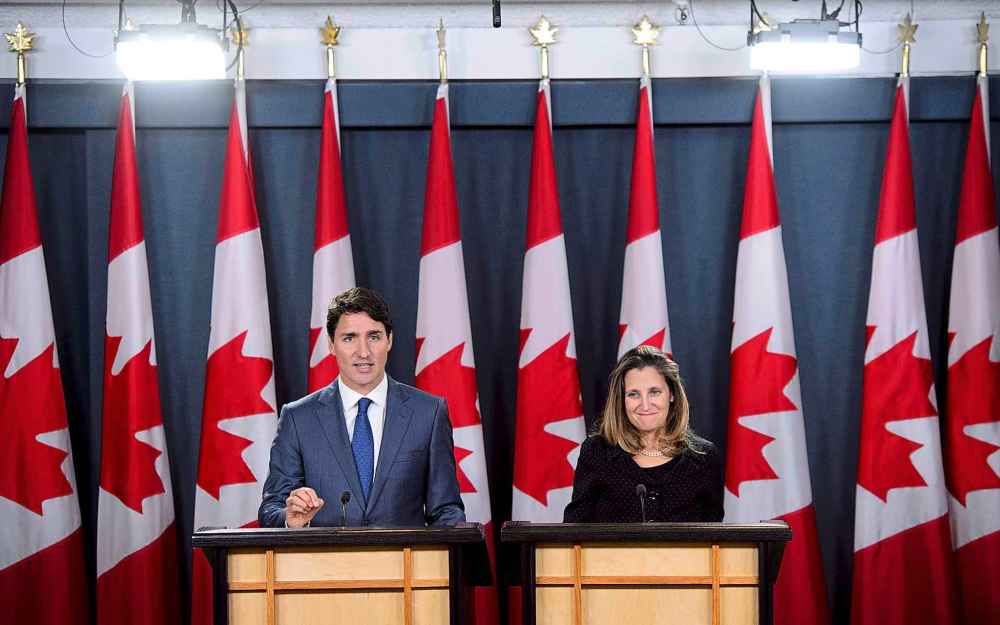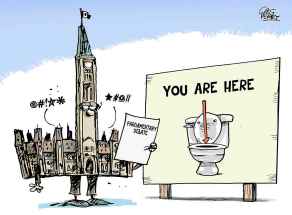Manitoba dairy takes hit, manufacturing stays course under USMCA
Read this article for free:
or
Already have an account? Log in here »
To continue reading, please subscribe:
Monthly Digital Subscription
$0 for the first 4 weeks*
- Enjoy unlimited reading on winnipegfreepress.com
- Read the E-Edition, our digital replica newspaper
- Access News Break, our award-winning app
- Play interactive puzzles
*No charge for 4 weeks then price increases to the regular rate of $19.00 plus GST every four weeks. Offer available to new and qualified returning subscribers only. Cancel any time.
Monthly Digital Subscription
$4.75/week*
- Enjoy unlimited reading on winnipegfreepress.com
- Read the E-Edition, our digital replica newspaper
- Access News Break, our award-winning app
- Play interactive puzzles
*Billed as $19 plus GST every four weeks. Cancel any time.
To continue reading, please subscribe:
Add Free Press access to your Brandon Sun subscription for only an additional
$1 for the first 4 weeks*
*Your next subscription payment will increase by $1.00 and you will be charged $16.99 plus GST for four weeks. After four weeks, your payment will increase to $23.99 plus GST every four weeks.
Read unlimited articles for free today:
or
Already have an account? Log in here »
Hey there, time traveller!
This article was published 01/10/2018 (2631 days ago), so information in it may no longer be current.
OTTAWA — Manitoba industries say their bruises might start to heal, after a turbulent year of free-trade negotiations that sent business to the United States.
“You kind of wonder why we went through this 12 to 15 months of really strange negotiations,” said Ron Koslowsky, the Manitoba vice-president for Canadian Manufacturers and Exporters.
“We ended up with just about the same thing we had before, except for a name change.”

Groups in Quebec are decrying the loosening of Canada’s tightly regulated dairy and poultry sectors under the new United States-Mexico-Canada Agreement, and Western Canada still faces uncertainty over softwood lumber. But Koslowsky said manufacturing represents the bulk of Manitoba’s continental trade.
“We see manufacturers in Canada are expanding more in the U.S., and they’re investing less in Manitoba,” Koslowsky said Monday.
Lower duties on online shopping won’t hit Winnipeg retailers
Winnipeg retailers are largely unscathed by the lower duties and taxes for parcels coming from the United States under the United States-Mexico-Canada Agreement, according to a large industry group.
Winnipeg retailers are largely unscathed by the lower duties and taxes for parcels coming from the United States under the United States-Mexico-Canada Agreement, according to a large industry group.
The Retail Council of Canada said these higher exemptions won’t amount to much, and that most Amazon.ca purchases are taxed as products coming from within Canada.
“This is a relative small change,” RCC spokesman Karl Littler said Monday.
Customers won’t pay Canadian taxes on imported parcels costing C$40 or less; that’s double the previous amount, but the U.S. had reportedly sought a limit of US$800.
Meanwhile, goods costing less than C$150 will be exempt from import duties, but Littler said that usually only means paying two per cent, and that Mexico got a worse deal.
— Dylan Robertson
However, he added inking the deal does mean some promising opportunities. American government procurement of Canadian goods, for example, could see more demand for NFI Group Inc. buses made in Winnipeg, he said.
David Wiens was much more pessimistic when reached at his dairy farm near Grunthal, 70 kilometres south of Winnipeg. He admitted changes to supply management largely impact other provinces, but said it will also hit a “fairly significant” number of Manitobans.
“The prime minister has always assured us that they would protect and defend the dairy industry,” said Wiens, head of the Dairy Farmers of Manitoba. “We are now looking for an explanation.”
The group says its $350-million industry employs 7,000 people in Manitoba, though this includes farms and processing, as well as the services farmers rely on. They’re concentrated in the southeast, lower Interlake, near Brandon, and rural areas such as St. Claude and Elm Creek.
The new deal ends a pricing class for industrial milk ingredients known as Class 7, which Wiens said will lead to so much U.S. surplus milk entering Canada that operating a newly opened Dairyland facility in Winnipeg “simply won’t be possible.”
Wiens echoed his industry’s criticisms, that loosening industry controls will lead to products from hormone-fed American cows, and Canada does a better job looking after its livestock.“I think both business and workers are feeling better than they felt yesterday.”–Trade Diversification Minister Jim Carr

Trade Diversification Minister Jim Carr said the late Sunday deal means certainty, and retaining the dispute-settlement system Canada frequently relies on can restore investor confidence.
“I think both business and workers are feeling better than they felt yesterday,” Carr told the Free Press.
Manitoba sold just under $9 billion in goods to the U.S. last year, accounting for 71 per cent of its exports. Carr, the MP for Winnipeg South Centre, is tasked with getting Canadian businesses to look beyond an over-dependence on the U.S., but he refused to call the former North American Free Trade Agreement a wake-up call.
He instead said he’s “as resolved as ever to expand” trade abroad, citing deals with Europe and Asia-Pacific countries.
Premier Brian Pallister released a statement that did not outline any particular winners or losers in the deal, and he did not take questions from reporters Monday.
Winners and losers
Here’s an early look at some of the winners and losers in the United States-Mexico-Canada Agreement.
Here’s an early look at some of the winners and losers in the United States-Mexico-Canada Agreement:
WINNERS
Automakers: A side letter published along with the main text of the agreement leaves out a percentage of eligible auto exports from tariffs — a move viewed as a win for the Canadian auto industry.
Dispute resolution: Canada fought hard to maintain a key dispute-resolution provision, known as Chapter 19, allowing independent panels to solve disputes involving companies and governments. It also preserved Chapter 20, a government-to-government dispute-settlement mechanism.
Environment: A chapter in the North American Free Trade Agreement allowing companies to sue governments over perceived mistreatment has been scrapped — a move Foreign Affairs Minister Chrystia Freeland says will result in lowered penalties for taxpayers as well as a strengthened ability to protect public health and the environment.
Cultural industries: Rules around copyright and intellectual property are set to change, extending the window after a creator’s death to preserve rights to 70 years from 50.
Online shoppers: Canadian consumers won’t have to fork out duties for online purchases from the U.S. worth up to $150, an increase from the current $20.
LOSERS
Dairy farmers: The dairy industry was quick to criticize the renegotiated USMCA, saying it will limit exports while opening Canada to more American products. Prime Minister Justin Trudeau, however, says there will be compensation for dairy farmers.
Steel and aluminum sector: Industry leaders say they are disappointed the trade deal doesn’t include an end to steep U.S. tariffs, adding there will be efforts to resolve the issue in the days leading to the final signing of the agreement.
Drugs: The deal extends patents on biological drugs to 10 years from eight — an additional two years than desired for access to cheaper generic drugs used to treat conditions like Crohn’s disease and rheumatoid arthritis.
JURY’S STILL OUT
Gender advocates: At the onset of negotiations, Freeland pushed for a chapter in the deal specific to gender rights as part of a broader promise to promote equality but no such chapter made its way into the USMCA. She says, however, there is some “good language” in USMCA around gender.
Indigenous Peoples: Assembly of First Nations National Chief Perry Bellegarde lobbied for inclusion of a separate chapter in the renegotiated agreement on Indigenous Peoples but it also fell by the wayside. Still, he sees the USMCA as “the most inclusive international trade agreement for Indigenous peoples to date,” pointing to provisions that protect rights.
— The Canadian Press
“Manitoba deeply values its trading relationships,” he said after a teleconference between Prime Minister Justin Trudeau and fellow premiers. Pallister echoed Carr in noting Manitoba has been part of the effort to lobby U.S. companies and state legislators to understand the interdependence of North American trade.
The CME and numerous other groups also asked the Trudeau government to push to have steel and aluminum tariffs dropped; Koslowsky said leaving them in place could undercut Manitoba companies that make agriculture equipment.

As a result of those tariffs, Canada has imposed countervailing duties, some of which still persist.
The federal Liberals have promised to remit some of tariff and tax gains back to impacted industries, but Koslowsky said it’s mostly large firms who have the time to find out how and access that cash. “There’s some hurdles to get through,” he said.
Koslowsky said some pharmaceutical companies with plants in Manitoba lose out from Canada harmonizing its time frame around when generic variations can be made from patented drugs, but he didn’t name any specific firms.
Koslowsky echoed the federal Tories in saying the Liberals need to revisit their looming carbon tax and consider dropping business taxes to keep up with American cuts.
dylan.robertson@freepress.mb.ca










